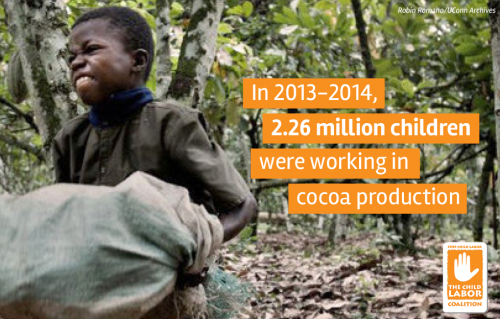Government officials in Ghana, as well as public commentators, are disputing the findings of a new report based on a recent study funded by the United States government which claims that the use of child labour has risen in cocoa farms in Ghana and Ivory Coast over the past decade despite industry promises to reduce it.
The new report findings support an earlier one, which was similarly disputed by both West African countries
According to the new report, the levels are now higher than in 2010 when companies including Mars, Hershey, Nestle and Cargill agreed to reduce the worst forms of child labour in Ghana and Ivory Coast’s cocoa sectors by 70% by 2020.
The two West African countries – which together produce about two-thirds of the world’s cocoa – had both questioned the methodology used in an earlier version of the report prepared by researchers from the University of Chicago in April this year.
Ghana’s government has again questioned the data in the revised report, released on Monday after the U.S. Department of Labor appointed a group of independent experts to conduct a review.
Ghana’s government was quoted in Monday’s report questioning the reliability of the figures that showed a reduction in the number of child labourers from the April estimate, while maintaining a similar prevalence rate.
“This raises eyebrows about the reliability of the findings for any meaningful policy formulation and implementation,” Ghana’s ministry of employment and labour relations said.
However, the government, like that of Ivory Coast has reiterated its commitment to eradicating child labour in cocoa farming.
But this is being seen locally as being tactful, rather than accepting blame for an infraction that at best is grossly exaggerated.
While Ghana’s government officials are publicly questioning the veracity of the data – and privately questioning the motives behind the report – public commentators and labour experts are pointing out that those who conducted the study and who assessed the results simply lack understanding of the ways in which West African rural societies operate.
They point out that in actual fact most of the children identified as victims of child labour in the report are simply children helping out their parents on the farm after school; more often than not on a voluntary basis resulting from a sense of responsibility towards the family which is inculcated in them at an early stage in local society.
Even some children rights advocates agree that the report is largely built on misconceptions. Queries one, on strict condition of anonymity: “Why would a parent prevent his or her child from going to school just to work on a cocoa farm, even though the school is not only free, but provides free meals as well?”
Instructively, that childrens rights advocate does not want to be quoted for fear of losing her funding which comes in part indirectly from the US government.
Some analysts assert that the same prudent diplomacy is behind the rather subdued reaction of both the Ghanaian and Ivorien governments – neither wants to rock the boat which ferries substantial foreign aid into their respective coffers.
However none of this completely changes the fact that true child labour still exists in both countries, which even critics of the report admit to; they simply insist that the report grossly exaggerates it.
Some critics go further to allege an Oliver Stone type conspiracy theory behind the report. They allege that both countries are being deliberately put on the defensive as retaliation for their recent success in imposing an extra US$400 per metric tonne ‘living standard differential’ on the cocoa beans they export.
These conspiracy theorists assert that the report is part of a wider scheme to ensure that the two countries do not feel comfortable enough to attempt further, even more ambitious efforts at influencing cocoa prices in their favour.
U.S. lawmakers have criticised the industry and U.S. customs authorities asked cocoa traders earlier this year to report where and when they encounter child labour in their supply chains.
Monday’s report cut the estimate of the number of children currently working in cocoa production in the two countries to 1.56 million, from more than 2 million in the April study, saying it had changed the ways it weighted its data. It did not give comparative totals from 10 years earlier.
But it said the proportion of children from agricultural households in cocoa growing areas that are engaged in child labour in the cocoa sector across Ivory Coast and Ghana had increased to 45% in 2018/19 from 31% in 2008/09.
The corresponding levels for hazardous work had risen to 43% from 30%, it added.
“Despite the efforts made by the governments, industry and other key stakeholders in combating child labour and hazardous child labour during the past 10 years, the child labour and hazardous child labour prevalence rates did not go down,” the report said.
It added that rates of child labour had stabilised since the last survey in 2013/14 and school attendance in cocoa-growing areas had risen even as cocoa production surged.
World Cocoa Foundation president Richard Scobey said the report showed child labour remains a persistent challenge but that government and company programmes to reduce it were making a difference.
“Targets to reduce child labour were set without fully understanding the complexity and scale of a challenge heavily associated with poverty in rural Africa and did not anticipate the significant increase in cocoa production over the past decade,” he added in a statement.
The International Cocoa Initiative (ICI), a foundation backed by industry and civil society, said what it called past sampling errors made it difficult to draw accurate comparisons over time.








